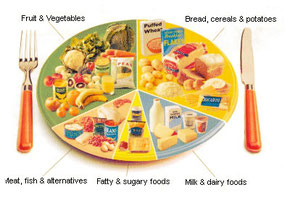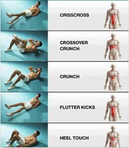
The ideal food intake recommendation for achieving a healthy weight should be based on your own personal food preferences ideally, following nutrient guidelines. The bottom line is that you have to control your calorie intake in order to have a healthy weight, regardless of the nutrient composition of your diet.
This article provides recommendations and tools for breaking down calories into carbohydrates, protein and fat needs depending on your total calorie intake.
Calorie Recommendations
The term calorie is a commonly used shorthand for "kilocalorie"(Kcal). Within a healthy, balanced diet, a man needs around 2,500Kcal a day to maintain his weight. For a woman, that figure is around 2,000Kcal a day. These values can vary depending on age, metabolism and levels of physical activity, among other things. However, if you are intending to lose weight, a daily food intake of 1,200 to 1,600 calories per day is often safe and effective for a healthy weight loss. These values also depends on your level of activity.
Breaking nutrients with "Calorie Breaker" app
Calorie breaker breaks down your calorie needs into carbohydrates, proteins and fats either by KCal/day or Grams/day based on your gender, age, height, weight and activity level.
Carbohydrates
Carbohydrates are the main source of energy that fuels our body and everything it does, even thinking.
For a healthy weight we recommend adults consume 45 to 65 percent of their daily calories from carbohydrates. Carbs provide 4 calories per gram. Therefore, you’d need 225 to 325 grams of carbs
when following a 2,000-calorie plan for example.
Carbohydrates are sugars and starches. They are found in fruit and some vegetables, dairy foods and grain-based foods like bread, breakfast cereals, rice and pasta. Eat some grain-based foods
that are wholegrain or high in fibre every day, to boost your fibre intake.
Proteins
Protein is important for the growth and repair of the body’s cells and for building muscle.
It can also be used to provide energy and helps increase satiety, which is beneficial for keeping healthy weight or weight loss plans. We recommend Proteins range from 10 to 35 percent of your
daily calorie intake. Proteins contains 4 calories per gram. Therefore, you should consume from 50 to 175 grams of protein when following a 2,000-calorie plan for example.
Animal-based foods are excellent sources of protein, such as fish, meat, chicken, eggs, milk, cheese and yoghurt. Good sources of vegetable-based protein include legumes – soybeans, baked
beans, kidney beans, chickpeas and lentils – nuts and seeds. Grain-based foods such as bread, cereal, rice and pasta also contribute some protein to the diet. It is best to choose protein-rich
foods that are low in saturated fat.
Fats
Fat contributes to energy intake and helps you absorb vital vitamins; therefore a healthy diet should always contain a certain amount of fat.
The two main forms of fat are saturated, predominately from animal sources, and unsaturated, predominately from vegetable sources. Because fat is a rich source of energy, you should try and eat
no more than your recommended intake. It is also important to choose unsaturated fats as much as possible. Unsaturated fats are beneficial for keeping a healthy weight or weight loss because they
help you feel full and can protect you against heart disease when used in place of saturated fats. We recommend adults to consume 20 to 35 percent of their total calories from fat. Fats provide 9
calories per gram. Therefore, you should consume from 44 to 78 grams of fat when consuming 2,000 calories per day, for example.
Heart-healthy, unsaturated fats are found in vegetable oils (sunflower, rapeseed and olive oil), fish oil, avocados, hummus, nuts and seeds.
Too much saturated fat can raise blood cholesterol, which can increase the risk of heart disease. You should therefore consume no more than your recommended daily intake. The reference value for
saturated fat for an average adult is around 24 grams.
Recommended articles






VPT (Wednesday, 21 July 2021 22:50)
Hi there, please kindly fill in this form for a full assessment -> https://www.virtual-personaltrainer.com/evaluation/ Regards, VPT
UtkarshUpadhyay (Wednesday, 21 July 2021 08:20)
My weight is 95kg at present!
I really need to lose it!
https://www.vibrationplateinfo.com (Tuesday, 28 November 2017 10:43)
Your blogs and each of its stuff is so pleasurable and valuable it is making me come back soon.